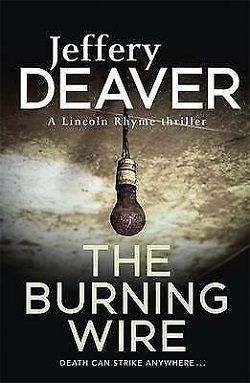In The Burning Wire, the ninth installment in Jeffery Deaver's Lincoln Rhyme series, readers are thrust into a high-stakes game of cat and mouse, where the stakes are nothing less than the safety of New York City. Deaver, known for his intricate plots and masterful pacing, delivers yet another gripping narrative that not only entertains but also challenges the reader's intellect and moral compass.
The story begins with a shocking act of violence: a city bus is reduced to a molten wreck, leaving behind a scene of chaos and fear. The weapon of choice? Electricity, wielded by a killer whose methods are as terrifying as they are ingenious. This invisible force becomes a character in its own right, representing the fragility of modern life and the pervasive fear that can grip a city when its very infrastructure is threatened. Deaver's choice to use electricity as a weapon is not just a clever plot device; it serves as a metaphor for the unseen dangers that lurk in everyday life, reminding us of how dependent we are on technology.
At the heart of the investigation is Lincoln Rhyme, a brilliant forensic criminologist who, despite his quadriplegia, remains a formidable force in the world of criminal investigation. Rhyme's character development throughout the series has been profound, and in this installment, we see him grappling with the dual pressures of his physical limitations and the urgency of the case at hand. His partnership with NYPD detective Amelia Sachs is central to the narrative, showcasing a dynamic that is both professional and deeply personal. Their relationship is tested as Rhyme's determination to solve the case begins to take a toll on his health and his relationships with those closest to him.
Deaver excels in creating a sense of urgency and tension that permeates every page. The narrative is interspersed with short, punchy chapters that propel the reader forward, mirroring the frantic pace of the investigation. The alternating perspectives, including that of FBI agent Fred Dellray and officer Ron Pulaski, add layers to the story, allowing readers to see the multifaceted nature of the investigation. This technique not only enhances the suspense but also deepens the reader's understanding of the characters' motivations and struggles.
One of the most compelling aspects of The Burning Wire is its exploration of fear—both personal and societal. The killer's demands and the chaos he creates tap into a primal fear of the unknown, forcing the characters to confront their own vulnerabilities. Rhyme's internal battle with his physical limitations serves as a poignant reminder of the human condition, illustrating that strength can manifest in various forms. His determination to continue working, even when it jeopardizes his health, raises ethical questions about the lengths one should go to in the pursuit of justice.
As the investigation unfolds, Rhyme finds himself juggling two high-profile cases: the electrical killer in New York and a notorious hired killer known as the Watchmaker in Mexico. This dual narrative adds complexity to the plot, allowing Deaver to explore themes of obsession, morality, and the consequences of one's choices. The juxtaposition of Rhyme's two cases highlights the interconnectedness of crime and justice, as well as the personal toll that such pursuits can take on an individual.
Deaver's meticulous attention to detail is evident throughout the novel. His extensive research into the science of electricity and its potential for destruction lends authenticity to the story, making the reader acutely aware of the real-world implications of the plot. This level of detail not only enhances the credibility of the narrative but also engages the reader's curiosity, prompting them to ponder the broader implications of technology in society.
In terms of character development, Deaver continues to flesh out Rhyme and Sachs, providing readers with a deeper understanding of their motivations and fears. Rhyme's struggle with his physical limitations and his relentless pursuit of justice create a compelling narrative arc that resonates on an emotional level. Sachs, as his partner, embodies resilience and strength, often acting as the moral compass in their partnership. Their relationship evolves throughout the story, reflecting the complexities of trust, dependency, and the sacrifices made in the name of justice.
Overall, The Burning Wire is a testament to Jeffery Deaver's prowess as a thriller writer. The novel is a masterclass in suspense, weaving together intricate plotlines, well-developed characters, and thought-provoking themes. Deaver's ability to keep readers on the edge of their seats while exploring deeper philosophical questions about fear, morality, and the human condition is what sets this book apart from other thrillers.
For fans of crime fiction, particularly those who appreciate a blend of intellectual challenge and emotional depth, The Burning Wire is a must-read. It stands alongside other notable works in the genre, such as Thomas Harris's Red Dragon and Michael Connelly's The Lincoln Lawyer, both of which also delve into the complexities of criminal psychology and the moral dilemmas faced by those who seek justice.
In conclusion, Jeffery Deaver has once again delivered a thrilling and thought-provoking narrative that will leave readers eagerly anticipating the next chapter in Lincoln Rhyme's journey. The Burning Wire is not just a story about a killer; it is a reflection on the nature of fear, the pursuit of justice, and the resilience of the human spirit.
























Reviews 0
Post a Reviews: